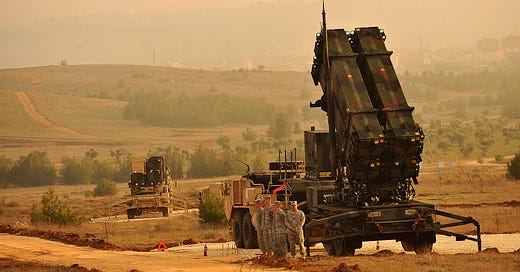Ukraina: Koalisjonen av villige
Den naive unggutten Donald har fått sitt hjerte knust av Vladimir. Men ikke ta for gitt at bromancen er over for godt.
Jeg er på ferie, så derfor blir denne artikkelen mer lettvinn enn vanlig, i det jeg hovedsaklig snylter på andre.
Trump var tilsynelatende ikke informert om forsvarsminister Hegseths beslutning om pause i våpenleveransene til Ukraina, som jeg skrev om i forrige uke. Nå er de i gang igjen, men det er beskjedne greier. Jeg holder fast ved at det er lite sannsynlig at USA vil gi hjelp av betydning utover den snart oppbrukte rammen som ble bevilget under Biden. Det kommer ikke en strøm med nye våpen, men noe sildrer inn.
Utsiktene til at USA vil tillate Ukraina, eller NATO-partnere på vegne av Ukraina, å kjøpe våpen har derimot økt med det som kan se ut som et brudd i bromancen mellom Trump og Putin. Det er i ferd med å dannes en «koalisjon av villige», med Storbritannia, Frankrike, Tyskland og kanskje Polen som viktigste partnere.
Her tillater jeg meg å sitere langt fra en artikkel av The Dispatch’ Nick Cattogio. (Vi får tilgi ham at han har en tendens til å skrive i lengste laget). Han har en interessant og spenstig vri på forholdet mellom de to.
“Situationship” is Zoomer lingo for a romantic relationship in which both parties are interested but with incongruous degrees of intensity. One wants commitment, the other prefers a “friends with benefits” arrangement. Yet rather than break things off definitively and seek more compatible partners, the situation just sort of … lingers.
That’s because each party is getting enough from it to keep them invested. The “friends with benefits” side continues to receive occasional, er, benefits while the committed side receives sporadic bursts of hope that those benefits might blossom into something more meaningful. (…)
The basic problem in any situationship is that the party seeking commitment fails to set boundaries. Trump refused to set boundaries by arming the Ukrainians robustly and now Putin is walking all over him, breaking his heart. (…)
The president now seems to be facing the bitter reality that Putin really does care more about genociding Ukrainians than he does about Donald Trump’s affection. He’s never going to commit. (…)
No one is willing to bet on sustained American support for the Ukrainians because that’s not how the president operates, and it’s really not how situationships operate. No one believes he’ll relinquish his romantic dream of putting the Cold War to bed and brokering an alliance with Putin.“
Jeg slenger også på konklusjonen til en annen analytiker jeg har respekt for, Ivo Daalder. Han er mest kjent som utenrikspolitisk rådgiver for Barack Obama, og har siden 2013 inntil helt nylig vært sjef for Chicago Council on Global Affairs.
“Trump’s record on Ukraine is reason for caution. He’s overestimated how easy it is to end the war. (“A half-baked negotiator could have settled this years ago,” he claimed in April.) He wrongly blamed the US, NATO, and Ukraine for the war—and has only reluctantly and much-belatedly come around to accepting that Russia may have something to do with it. He still ignores the underlying political causes of the war, blaming the “killing” and “bloodbath” on both sides equally. "Sometimes you see two young children fighting in the park,” he explained last month. “Sometimes you're better off letting them fight more before you pull them apart.”
And that’s the real reason to be skeptical about suggestions that Trump now “gets it” and will do what he should have done all along: firmly side with Ukraine, the war’s victim, by sending it as much military, intelligence, and other support as possible, and firmly oppose Russia to make clear to Putin that the United States and its allies will stay in the fight for as long as it takes for him to understand he can and will not win.”



